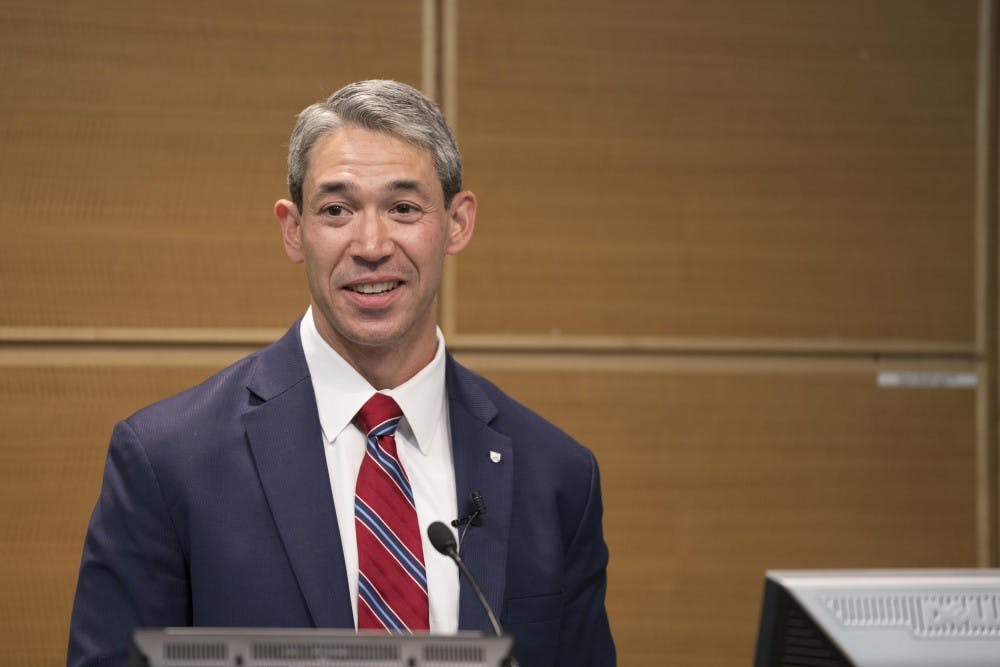Seventeen years after graduating from Penn, the newly elected Mayor of San Antonio Ron Nirenberg returned to the Annenberg School for Communication on Monday evening to talk to students about his political career as a progressive independent.
Nirenberg, 40, was invited back to campus to speak at the annual George Gerbner Lecture in Communication. His lecture, titled “Be A Better Neighbor: The Education of a Mayor,” charted his journey from Penn to the mayor's office. Last year, Nirenberg made headlines when he unseated the former mayor Ivy Taylor in a decisive election victory in San Antonio, Texas.
Recounting the experience, the 2001 Annenberg School graduate described the challenges of running as a progressive independent against a sitting mayor. He noted the repercussions of challenging an “establishment pick,” such as the threat of antagonistic smear campaigns.
“If you threaten that establishment you will have the kitchen sink thrown at you,” he said.

In response to these challenges, Nirenberg said he opted for transparency, and released a 24-page “vision plan,” which outlined his goals and aspirations for his time in office.
“My consultant said, ‘Don’t do this. Don’t put all of your ideas on paper because that would hold yourself accountable to every dot you put in there,’" he reflected. “I said, ‘You know what? I’m not in this for glory and career, I’m in this to make sure people who vote for me know what I stand for.'”
The Monday lecture opened with brief remarks from Michael Delli Carpini, the dean of the Annenberg School, followed by a long introduction from Carolyn Marvin, an emeritus Communication professor and Nirenberg's former academic advisor from his time at Penn.
RELATED:
Former VP Joe Biden made a low-profile visit to Penn on Feb. 28
At Penn Law events, Justice Ginsburg discussed #MeToo, politics, and her 'faith' in millenials
Marvin described Nirenberg as she once knew him: a budding ethnographer and an avid bodybuilder, who sported bell-bottom jeans and a curly haircut; but on this evening, she said she saw him as a “son of Annenberg,” who is a part of a wider movement to shift Texas’ political leanings.
“He’s part of a generation that is kind of beginning to turn Texas blue,” Marvin remarked.
Nirenberg, who received his master's degree in Communication in 2001, began working at the Annenberg Public Policy Center the year of his graduation directing the Student Voices program. According to the program's website, Student Voices is a "nationwide civic engagement initiative to address the problem of declining political involvement by young people."

Nirenberg said working with Student Voices provided “some real world lessons about the positive impact that communities can have on systems of government,” adding that this experience taught him about what people want in a politician and inspired him to pursue a career in civic life.
Jeremy Quattlebaum, a content creator for the Annenberg Public Policy Center, who worked with Nirenberg during his time with Student Voices, said his former colleague's path to civic success was unsurprising.
“Our project was to see what students can do to affect local government, now he’s the chief executive of a major city,” he said. “The shoe is on the other foot.”
Nirenberg left his Annenberg job in 2009 and moved with his wife Erika Prosper, who also received her master's degree in Communication from the Annenberg School in 2000, and his young son, Jonah, to San Antonio.
While working part-time as a professor in the Department of Communication at Trinity University, he said he also led the university’s radio station where he worked to develop a “Year in Jazz” project that crafted a music series covering the city’s history and collaborated with city leaders in a social impact project.
In 2013, a city council seat opened up and Nirenberg's friends and family convinced him to run. He won the seat and went on to serve two terms as the councilman for District 8 – the most demographically and politically diverse district in the city.
When he spoke about his political ambitions, Nirenberg said he often keeps his son, Jonah, and the younger generation in mind.
"It became not only a professional mission, but a personal one, to improve the city [Jonah] would ultimately inherit," he said. "I found myself falling into local government as a necessary next step to have an impact on the city I leave behind."
Nirenberg also described how he brought forth a resolution to the City Council supporting the Paris Climate Accord. In the following hundred days in office, his office ordered the removal of one of the city’s most prominent Confederate monuments.
"Local governments and city government have had to take on more of the burden of basics in our communities," he said. "There are a lot of things happening in the world right now that are difficult, but if we remain solutions-focused, which we have to do on the local level, we create positive change."



